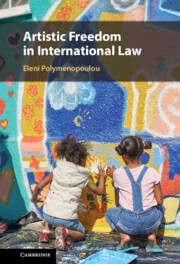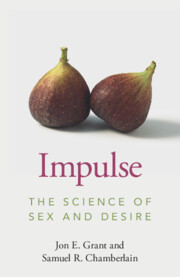Refine search
Actions for selected content:
52 results
Consumption of Male–Female, Female–Female, and Male–Male Pornography: Attentional Focus and Associated Discomfort in Spanish Men with Different Sexual Attraction
-
- Journal:
- The Spanish Journal of Psychology / Volume 28 / 2025
- Published online by Cambridge University Press:
- 28 July 2025, e14
-
- Article
-
- You have access
- Open access
- HTML
- Export citation
7 - Be Careful about the Publisher
-
- Book:
- Selling Sexual Knowledge
- Published online:
- 24 June 2025
- Print publication:
- 10 July 2025, pp 213-243
-
- Chapter
-
- You have access
- Open access
- HTML
- Export citation
1 - Holywell Street Medicine
-
- Book:
- Selling Sexual Knowledge
- Published online:
- 24 June 2025
- Print publication:
- 10 July 2025, pp 22-56
-
- Chapter
-
- You have access
- Open access
- HTML
- Export citation
4 - Obscene … in a Certain Sense
-
- Book:
- Selling Sexual Knowledge
- Published online:
- 24 June 2025
- Print publication:
- 10 July 2025, pp 121-151
-
- Chapter
-
- You have access
- Open access
- HTML
- Export citation
Sexual Violence in Wartime and Peacetime: Violence Against Women in the 20st Century
-
- Journal:
- Asia-Pacific Journal / Volume 19 / Issue 5 / March 2021
- Published online by Cambridge University Press:
- 14 March 2025, e9
-
- Article
-
- You have access
- Open access
- Export citation
9 - Behavioural Addictions
-
- Book:
- How to Talk to Your Child About Drugs
- Published online:
- 13 February 2025
- Print publication:
- 06 March 2025, pp 182-195
-
- Chapter
- Export citation
Shaped by censoring attitudes: pornography in late nineteenth- and early twentieth-century Italy
-
- Journal:
- Modern Italy / Volume 30 / Issue 4 / November 2025
- Published online by Cambridge University Press:
- 22 January 2025, pp. 429-443
- Print publication:
- November 2025
-
- Article
-
- You have access
- Open access
- HTML
- Export citation
Chapter 10: - Relationships
-
- Book:
- Adultish
- Published online:
- 10 October 2024
- Print publication:
- 01 August 2024, pp 181-202
-
- Chapter
- Export citation
4 - ‘Pornography’, ‘Obscenity’, and the Suppression of Libertine Literature
-
-
- Book:
- The Cambridge World History of Sexualities
- Published online:
- 26 April 2024
- Print publication:
- 16 May 2024, pp 71-93
-
- Chapter
- Export citation
12 - Sexuality in Post-war Liberal Democracies
-
-
- Book:
- The Cambridge World History of Sexualities
- Published online:
- 26 April 2024
- Print publication:
- 16 May 2024, pp 247-274
-
- Chapter
- Export citation
19 - Erotic Art in World History
-
-
- Book:
- The Cambridge World History of Sexualities
- Published online:
- 26 April 2024
- Print publication:
- 16 May 2024, pp 410-442
-
- Chapter
- Export citation
16 - Sexual Pleasures and Perils in Nineteenth-Century London
-
-
- Book:
- The Cambridge World History of Sexualities
- Published online:
- 26 April 2024
- Print publication:
- 16 May 2024, pp 329-352
-
- Chapter
- Export citation
22 - Public History and Sexuality
-
-
- Book:
- The Cambridge World History of Sexualities
- Published online:
- 26 April 2024
- Print publication:
- 16 May 2024, pp 493-516
-
- Chapter
- Export citation
Tackling Non-Consensual Dissemination of Intimate Images in India’s Contemporary Legal Framework
-
- Journal:
- International Annals of Criminology / Volume 61 / Issue 3-4 / December 2023
- Published online by Cambridge University Press:
- 12 October 2023, pp. 355-383
- Print publication:
- December 2023
-
- Article
- Export citation
7 - ‘No Moral Defense’
-
- Book:
- J. M. Coetzee and the Limits of the Novel
- Published online:
- 08 June 2023
- Print publication:
- 22 June 2023, pp 160-183
-
- Chapter
- Export citation
Chapter 11 - Defoe and Pornography
- from Part II - Literary Context
-
-
- Book:
- Daniel Defoe in Context
- Published online:
- 27 April 2023
- Print publication:
- 11 May 2023, pp 89-95
-
- Chapter
- Export citation

Artistic Freedom in International Law
-
- Published online:
- 06 April 2023
- Print publication:
- 13 April 2023
Sexualizing the Killing of Women: The Rise of the “Rough Sex” Defence in Anglo-American Jurisdictions
-
- Journal:
- International Annals of Criminology / Volume 61 / Issue 1 / March 2023
- Published online by Cambridge University Press:
- 12 April 2023, pp. 1-25
- Print publication:
- March 2023
-
- Article
-
- You have access
- Open access
- HTML
- Export citation

Impulse
- The Science of Sex and Desire
-
- Published online:
- 09 February 2023
- Print publication:
- 09 February 2023
6 - Beyond Porn and Discreditation
-
- Book:
- Political Theory of the Digital Age
- Published online:
- 02 February 2023
- Print publication:
- 09 February 2023, pp 119-136
-
- Chapter
- Export citation
